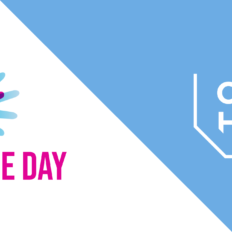The Digital Pharma East 2024 conference was an energetic melting pot of thought-provoking topics and future-forward discussions between pharma industry leaders, healthcare professionals, and patient advocates. This year’s event was a testament to the ever-evolving healthcare landscape, emphasizing holistic approaches to medicine and marketing, the importance of increased patient-centricity, and the growing prevalence of AI.
Monitoring the Pulse of Healthcare Marketing Trends at Digital Pharma East
By Kristi Bray, Senior Copywriter

Holistic Healthcare: More than a Condition
The importance of maintaining a holistic approach to healthcare was felt right from the get-go with kiosks offering massage chairs, a puppy park, a golf simulator, oxygen bars, specialty coffee, smoothies, and more. These amenities were fun, interactive reminders that wellness extends well beyond medical treatments.
Presenters across sessions highlighted the importance of understanding patient preferences and behaviors both related and unrelated to their medical conditions. One compelling case study showcased real patients from around the world engaging in activities they love, from gymnastics to martial arts, and dining out with friends. The campaign was touted as extremely successful, which was attributed to a strong narrative underscoring the need for healthcare marketers to recognize the multifaceted lives of patients. Similarly, the concept of “white coat vs. blue jean research” was introduced, highlighting the different contexts in which healthcare professionals (HCPs) conduct research—both in the office and at home.
The overarching message was clear: By acknowledging that patients and HCPs have lives outside of their health condition or specialty, healthcare marketers can better understand how, when, and where to engage them. Healthcare is a marriage of medication and wellness, and omni-messaging, not just omnichannel marketing, is essential in supporting it.
Patient-Centricity: More than a Patient
A recurring theme throughout the conference was the importance of putting patients at the front and center of healthcare marketing initiatives. This means involving them early in the planning process and seeing them not just as patients but as partners. One presenter shared a story about a data-driven idea that the marketing team was excited about but fell flat with their patient advisory board. The story highlighted the necessity of patient input to ensure that healthcare marketing solutions will resonate with those they aim to serve.
Patient speakers themselves shared how other patients’ stories were the most powerful in their own journeys. They said they were more likely to trust pharmaceutical companies that used authentic, unscripted testimonials. They reiterated the importance of messaging to patients as equal individuals.
Several presenters shared their personal experiences as a patient or caregiver, adding depth to their insights. One panelist even introduced herself first as a patient before sharing her professional role as a marketer. These seemingly small details were effective reminders that although we call our consumers “patients” it is but one fraction of their diverse identities.
AI’s Growing Prevalence: More than a Trend
AI was a hot topic throughout the conference, with discussions on everything from its current uses to its future potential to revolutionize healthcare. From quickly analyzing first and third-party data sets to providing predictive insights, AI’s capabilities were showcased extensively.
One agency demonstrated their use of an AI platform to collect proprietary data and personify a target audience through “custom retrieval augmented generation”. In other words, they use information from real interviews to create pretend personalities of HCPs and patients as a shortcut for researching and understanding their target audience.
AI’s applications in content creation were also highlighted, including generating sample letters of appeal, chatbot responses, and video voiceovers. The iterative nature of AI was embraced, with presenters encouraging a mindset of “failing fast” to learn and adapt quickly as technology continues to evolve. Even the regulatory experts shared an optimistic outlook on AI’s compliant uses in both marketing and the MLR process.
Although it may seem paradoxical, strong cases were made for the use of AI to further humanize healthcare and pharmaceutical marketing.


